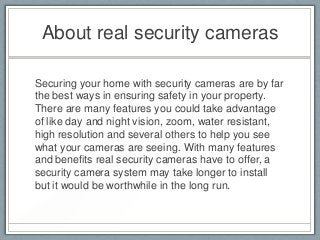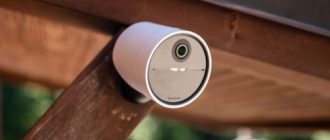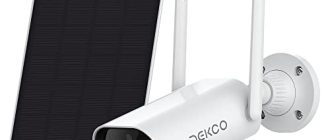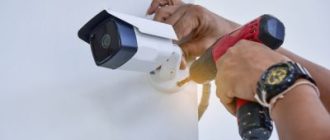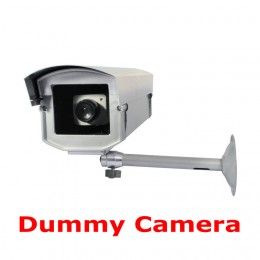
Advantages and disadvantages of fake security cameras
Fake security cameras are a cost-effective and popular option for individuals and businesses looking to enhance their security measures without breaking the bank. These cameras are designed to mimic the appearance of real security cameras, creating the illusion of surveillance and deterring potential intruders.
One of the main advantages of using fake security cameras is their affordability. Real security cameras can be expensive, especially when multiple cameras are needed to adequately cover a large area. Fake cameras, on the other hand, offer a budget-friendly alternative while still serving as a deterrent.
Another advantage of fake security cameras is their ease of installation. Real cameras often require complex wiring and professional installation, whereas fake cameras can be easily mounted in strategic locations without the need for extensive setup. This makes them a convenient option for those who want to quickly boost their security.
Despite their advantages, fake security cameras do come with certain disadvantages. The most obvious disadvantage is that they do not provide actual surveillance or recording capabilities. This means that if a crime or incident occurs, there will be no captured footage to assist with identifying the culprit or providing evidence.
In conclusion, fake security cameras offer a cost-effective and easy-to-install security solution, with the added benefit of acting as a deterrent. However, it is important to weigh the advantages against the disadvantages, particularly the lack of actual surveillance capabilities, before making a decision on whether to utilize fake security cameras.
Deterrence and Prevention
Fake security cameras can be a powerful tool for deterring potential criminals. The mere presence of a security camera, even if it is fake, can make potential intruders think twice before attempting to break into a property. This is because they do not want to risk being caught on camera and possibly identified later. The sight of a security camera can create a sense of fear and uncertainty in the minds of would-be criminals, leading them to choose an easier target.
Furthermore, the cost of installing real security cameras can be quite expensive, especially for homeowners or small businesses. Fake security cameras offer a more affordable alternative, allowing individuals to create the illusion of a fully monitored and secured property without breaking the bank. This affordability factor makes fake security cameras an attractive option for those looking to enhance their security measures on a budget.
However, it is important to acknowledge the disadvantages of relying solely on fake security cameras. While they may deter some criminals, experienced or determined criminals may be able to distinguish between real and fake cameras. This can lead to a false sense of security, as these individuals may proceed with their criminal activities despite the presence of the cameras. Additionally, fake security cameras do not provide any actual surveillance or recording capabilities, meaning that they are unable to capture footage of any criminal activity that does occur.
In conclusion, fake security cameras have their advantages when it comes to deterrence and prevention. They are cost-effective and can create the illusion of a fully monitored property, deterring potential criminals. However, they should not be solely relied upon as a security measure, as they lack the ability to capture actual footage and may not deter experienced criminals.
Cost-Effective Solution
One of the main advantages of using fake security cameras is their cost-effectiveness. Real security cameras can be quite expensive, especially if you need multiple cameras to cover a large area. On the other hand, fake security cameras are relatively inexpensive, making them a more affordable option for those on a tight budget.
In addition to their initial lower cost, fake security cameras are also cheaper to maintain. Unlike real security cameras that require regular maintenance, such as cleaning, repairs, and software updates, fake security cameras do not have any ongoing costs. This means that you can save on expenses in the long run by opting for fake security cameras over real ones.
Furthermore, fake security cameras require less installation time and effort compared to real security cameras. Real security cameras often require professional installation, which can be time-consuming and costly. In contrast, fake security cameras can be easily installed by anyone, as they typically come with simple mounting brackets or adhesive backings.
However, it is important to consider the drawbacks of using fake security cameras. While they may provide a cost-effective solution, fake security cameras do not actually provide any real security. They cannot record footage or transmit it to a monitoring station. Therefore, if an incident does occur, you will not have any video evidence to aid in identifying culprits or preventing future incidents.
Additionally, fake security cameras may not be as effective at deterring criminals compared to real security cameras. Seasoned criminals may be able to recognize fake security cameras and find ways to bypass or disable them. This means that relying solely on fake security cameras for your security needs may leave you vulnerable to break-ins or other criminal activities.
| Advantages: | – Cost-effective | – Low maintenance costs | – Easy installation |
| Disadvantages: | – No real security | – Ineffective deterrent for experienced criminals |
Easy Installation
One of the major advantages of fake security cameras is their easy installation process. Unlike real security cameras, fake cameras do not require any complicated wiring or professional installation. They can be easily mounted on the wall or ceiling with a few screws or adhesive tape. This makes them a convenient choice for homeowners or businesses who want to enhance their security without the hassle of a complex installation process.
Furthermore, the simplicity of the installation process also means that fake cameras can be easily relocated if needed. They can be moved to different locations as per the changing security needs, making them a flexible security solution.
However, it’s important to note that the easy installation of fake security cameras can also be a disadvantage. As these cameras do not have any functional components, they may not provide an adequate level of security. Experienced burglars or criminals may easily identify the fake cameras and proceed with their intended activities. Therefore, it is important to consider the limitations of fake cameras before relying solely on them for security purposes.
Flexibility and Adjustability
One of the advantages of fake security cameras is their flexibility and adjustability. Unlike real security cameras that require professional installation and wiring, fake security cameras are easy to install and can be placed in various locations.
These cameras are often designed to resemble real security cameras and come with a mounting bracket that allows them to be easily mounted on walls, ceilings, or any other surface. This flexibility allows users to place the fake cameras in strategic locations to deter potential intruders.
Additionally, fake security cameras are adjustable, meaning they can be easily positioned to capture the desired area. Some models have rotating heads that can be adjusted to cover a wide range of angles, while others have a fixed position but can be tilted up or down to cover a specific area.
The flexibility and adjustability of fake security cameras make them ideal for both indoor and outdoor use. They can be placed in areas where real cameras may not be feasible or cost-effective, such as in remote locations or in areas with limited access to power sources.
- Easy to install and move
- Can be placed in strategic locations
- Flexible mounting options
- Adjustable to capture desired area
- Suitable for indoor and outdoor use
No Legal Restrictions
One of the advantages of using fake security cameras is that there are no legal restrictions associated with them. Unlike real security cameras, which may require permits or compliance with certain laws and regulations, fake security cameras can be installed and used without any legal consequences.
This lack of legal restrictions can make fake security cameras a more flexible and hassle-free option for enhancing security. Business owners and homeowners can easily add extra layers of security to their premises by simply installing fake security cameras in strategic locations.
Furthermore, the absence of legal restrictions means that individuals can use fake security cameras in various settings, such as offices, retail stores, parking lots, or residential areas, without worrying about compliance with specific security camera laws or regulations.
It is important to note, however, that while fake security cameras do not have legal restrictions, they also do not provide the same level of security as real security cameras. They are merely a deterrent and may not capture actual incidents or provide evidence in case of a security breach.
Low Maintenance
One of the advantages of fake security cameras is that they require very low maintenance compared to real security cameras. With real security cameras, regular maintenance such as checking the wiring, cleaning the lenses, and replacing faulty parts is necessary to ensure that the cameras are working properly. This can be time-consuming and costly.
On the other hand, fake security cameras do not require any maintenance. Since they do not actually function as security cameras, there is no need to check the wiring or clean the lenses. This can save both time and money in the long run, as there are no ongoing costs associated with maintenance.
Additionally, the lack of maintenance required for fake security cameras means that they can be installed in hard-to-reach or inaccessible areas. Real security cameras may be limited in where they can be placed due to the need for regular maintenance. Fake security cameras, on the other hand, can be installed in locations that provide a visible deterrent without the need for ongoing maintenance.
| Visible deterrent | No actual security |
| Low cost | No recording or live feed |
| Easy installation | Can be ineffective against determined criminals |
| No maintenance | Limited customization options |
Psychological Impact
One of the advantages of using fake security cameras is the psychological impact it can have on potential criminals. Fake cameras create the illusion of surveillance and can deter criminals from targeting a property. The mere presence of a security camera, even if it is fake, can make potential criminals think twice before committing a crime.
However, there are also disadvantages to using fake security cameras in terms of psychological impact. Some criminals may become familiar with the appearance of fake cameras and be able to easily identify them. This can lead to a false sense of security for property owners, as criminals may not be deterred by the presence of a fake camera.
Additionally, if a crime does occur and the property owner discovers that their security camera was fake, it can lead to feelings of insecurity and vulnerability. The property owner may feel betrayed by the false sense of security that the fake camera provided.
In summary, while fake security cameras can have a positive psychological impact by deterring potential criminals, they also have the potential to create a false sense of security and feelings of vulnerability if a crime does occur.
Ineffective Against Professional Criminals
While fake security cameras can serve as a deterrent to casual criminals or opportunistic thieves, they are often ineffective against professional criminals. These individuals are experienced in their trade and can easily identify the telltale signs of a fake security camera.
One of the main disadvantages of fake security cameras is their lack of functionality. Unlike real security cameras, fake cameras do not actually record any footage or provide any real-time monitoring. Professional criminals are aware of this limitation and can easily exploit it to their advantage.
Professional criminals may conduct research on a targeted location to identify any potential security vulnerabilities. Once they determine that the security cameras are fake, they can proceed with their criminal activities without fear of being caught on tape.
Furthermore, fake security cameras lack the ability to provide any meaningful evidence in the event of a crime. Law enforcement agencies and insurance companies rely on video footage as a crucial piece of evidence to identify suspects and validate claims. In the absence of real surveillance footage, the chances of apprehending the criminals and recovering stolen items are significantly reduced.
Moreover, professional criminals may possess the necessary knowledge and skills to disable or bypass fake security cameras. They can easily identify the wiring or power source differences between real and fake cameras. Once they disable the fake cameras, they can go about their illegal activities without any obstruction.
Overall, while fake security cameras may have their advantages in deterring casual criminals, they are ultimately ineffective against professional criminals. Their lack of functionality and inability to provide meaningful evidence make them an unreliable defense system against more experienced and determined criminal individuals.
Limited Surveillance Coverage
One of the main disadvantages of using fake security cameras is the limited surveillance coverage they provide. While these cameras may appear to be real and act as a deterrent to potential criminals, they do not actually capture any footage or provide any real-time monitoring.
The advantages of fake security cameras lie in their ability to create a perception of security and dissuade potential intruders. However, it is important to note that these cameras do not offer any actual protection or surveillance. They cannot record or transmit video, and therefore, they do not provide any evidence in case of a security breach or crime.
Real security cameras, on the other hand, are able to provide comprehensive surveillance coverage. They can capture and record video footage, allowing for real-time monitoring and review. In addition, they often come with advanced features such as motion detection and night vision, enhancing their effectiveness in ensuring security.
For those seeking reliable security measures, it is important to consider the limitations of fake security cameras. While they may offer some level of deterrence, they are not a substitute for genuine security cameras that provide actual surveillance coverage and evidence in case of incidents.
False Sense of Security
One of the main disadvantages of using fake security cameras is the false sense of security they provide. While these cameras may look and even function like real security cameras, they do not actually provide any level of security or surveillance.
Having fake security cameras can lull people into a sense of complacency, thinking that they are being monitored and protected. However, criminals who are aware of these fake cameras can easily identify them and find ways to bypass or exploit them. This can leave your property vulnerable and increase the risk of theft or vandalism.
Additionally, fake security cameras do not have any recording capabilities, so there is no footage to review or use as evidence in the event of an incident. This can be a major drawback if you ever need to investigate a crime or prove the innocence of someone wrongly accused.
Furthermore, relying solely on fake security cameras can deter you from implementing other security measures. You may feel that the presence of these cameras is enough to protect your property, neglecting other vital aspects such as proper lighting, alarms, or real security cameras.
In conclusion, while fake security cameras may seem like a cost-effective and convenient option, they come with significant disadvantages. They can create a false sense of security, leave your property vulnerable, and limit your ability to gather evidence. It is important to carefully consider the effectiveness and drawbacks of fake security cameras before relying on them for your security needs.
Possible Legal Consequences
Although using fake security cameras may seem like a cost-effective and convenient solution to enhance security, there are several disadvantages to consider. One significant disadvantage is the potential legal consequences.
Using fake security cameras can create a false sense of security and may give people a false impression that they are being monitored and protected. This can lead to legal issues if someone relies on the presence of these cameras and suffers harm or loss due to a lack of actual surveillance.
In many jurisdictions, the use of fake security cameras is considered deceptive and can be classified as a form of fraud or misrepresentation. This can result in legal penalties, fines, or even criminal charges. Additionally, if a lawsuit arises from an incident where the presence of a fake camera is a contributing factor, the property owner or business may face liability for negligence.
Furthermore, if law enforcement agencies or authorities discover the use of fake security cameras, it could damage the reputation of the property owner or business. This can lead to loss of trust from customers, clients, or tenants, which can have significant financial and reputational consequences.
In conclusion, while using fake security cameras may initially seem like an inexpensive and practical solution, the potential legal consequences should be carefully considered. Property owners and businesses should weigh the advantages and disadvantages and explore legal regulations in their specific jurisdiction before implementing fake security cameras.
Lack of Recording and Evidence
One of the major disadvantages of fake security cameras is the lack of recording and evidence. Unlike real security cameras that can capture and store footage, fake cameras are unable to record any footage. This means that if a crime were to occur, there would be no video evidence to help identify the perpetrator or provide crucial information to law enforcement.
Real security cameras provide a valuable source of evidence in the case of criminal activity. They can help solve crimes, identify suspects, and provide crucial footage for investigations. Fake cameras, on the other hand, offer no such advantage. They may give the illusion of security, but when it comes to providing actual evidence, they fall short.
Without the ability to record, fake security cameras also lack the ability to deter criminals effectively. While their presence may discourage some opportunistic criminals, more determined individuals may be able to recognize the fakes and proceed with their illegal activities without fear of being caught on camera. This can render the entire purpose of having security cameras obsolete.
Furthermore, without recording capabilities, there is also no way to review footage for incidents that may have occurred outside of the immediate area of the camera. This can be a significant disadvantage in cases where crimes or incidents happen just outside the camera’s field of view or in blind spots. Real security cameras would be able to capture such incidents, whereas fake cameras would be useless in providing any evidence.
In conclusion, the lack of recording and evidentiary capabilities is a significant disadvantage of fake security cameras. While they may offer some advantages in terms of cost and deterrence, their inability to record footage and provide evidence greatly limits their effectiveness in maintaining security and preventing crime.
Ethical and Moral Concerns
Fake security cameras raise various ethical and moral concerns. While their intention may be to deter criminals and make people feel safer, the use of these cameras can be seen as deceptive and dishonest.
One of the main ethical concerns is the potential false sense of security that fake security cameras create. When people see these cameras installed, they may believe that they are being monitored and protected, when in reality, there is no actual surveillance taking place. This can lead to a dangerous situation where people may let their guard down and become vulnerable to criminal activity.
Fake security cameras also raise concerns about privacy rights. As these cameras do not actually record any footage, they do not have the same legal requirements and restrictions as real security cameras. This lack of regulation raises questions about the invasion of privacy and the potential for abuse.
Another ethical concern is the potential for discrimination. If fake security cameras are used in certain areas or neighborhoods, it may send a message that these areas are not safe or deserving of real security measures. This can contribute to the perpetuation of stereotypes and further marginalize already disadvantaged communities.
Furthermore, using fake security cameras can undermine the trust between individuals and institutions responsible for their safety. The presence of these cameras can create a false sense of security, leading people to rely on their presence rather than investing in real security measures. This can result in a lack of vigilance and accountability, ultimately putting people at greater risk.
In conclusion, while fake security cameras may have some advantages, such as cost-effectiveness and easy installation, their use also raises significant ethical and moral concerns. It is important to carefully consider the potential disadvantages and the impact they can have on individuals and communities before deciding to use fake security cameras.
Q&A:
What are the advantages of using fake security cameras?
Using fake security cameras can be a cost-effective way to deter potential criminals. They are often cheaper than real cameras and can give the illusion of a monitored area. Additionally, fake cameras require no maintenance or monitoring, so they can save both time and money.
Are fake security cameras effective in preventing crime?
Fake security cameras can be effective in preventing crime to some extent. They can give the perception that an area is being monitored, which can discourage potential criminals from attempting illegal activities. However, some experienced criminals may be able to identify fake cameras and still proceed with their plans.
What are the disadvantages of using fake security cameras?
One major disadvantage of using fake security cameras is that they do not provide any actual surveillance or evidence in case of a real crime. If a crime does occur, the fake cameras will not capture any footage that can be used for investigation or prosecution. Additionally, some people may argue that relying solely on fake cameras can create a false sense of security.
Can fake security cameras be easily identified?
Fake security cameras can be easily identified by experienced criminals or individuals familiar with security systems. They may look less realistic or lack features such as blinking lights that are commonly found on real cameras. However, for the average person, it can be difficult to distinguish between fake and real cameras without close inspection.
Are there any legal issues with using fake security cameras?
The use of fake security cameras is generally legal as long as they are not used to deceive or harm individuals. However, laws regarding surveillance and security cameras may vary by jurisdiction, so it is important to check local regulations before installing fake cameras. Additionally, if real surveillance cameras are installed alongside fake ones, it is crucial to inform individuals about the presence of both real and fake cameras to avoid any legal issues.

